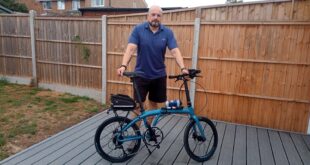Cycling UK has warned that an increase in private car use could lead to ‘crippling’ congestion and cost the economy over £15 billion per year, unless more is done to make it easier for people to walk and cycle shorter distances.
The charity has raised its concerns as England emerges from a second lockdown and the UK starts planning for a post-pandemic world. It has pointed to findings from the RAC’s Report on Motoring, which indicates there is a ‘significant’ change in public attitudes towards public transport. The report shows only 43% agree they would use their cars less in a post-pandemic world if there was better public transport, a sharp fall from 57% in 2019, and the lowest figure since 2002.
Duncan Dollimore, Cycling UK’s head of campaigns, said: “Many people jump in the car because they don’t think there’s a realistic alternative. For some trips and some people there might not be, but most trips in the UK – to the shops, work or dropping the kids off at school – are under five miles. Nobody’s suggesting that every one of those journeys will be walked or cycled, but a lot of them could be.
“What we need to make sure we get right for the post-pandemic UK is the creation of other options for those shorter journeys to driving – that means cycle lanes separated from traffic and low traffic neighbourhoods. The cost to the individual and economy is too great not to do otherwise.”
Cycling UK research has shown that there is a risk of British roads being clogged with congestion if the current trend to drive to work continues, which could have ‘huge’ costs for both the individual and economy. The Inrix global traffic scorecard calculated last year that congestion cost the average UK road user £894 per year and the wider economy £6.9 billion.
Government figures, from 21st September-4th October this year, show that around 59.3% of the UK workforce were working at their normal place of work, compared to pre-COVID levels, but generating 88% of pre-COVID weekday car traffic. If people continue to choose driving over other options in similar proportions, Cycling UK has estimated that an 8% increase in employees returning to the workplace would generate the extra 12% increase in traffic to take the UK up to pre-COVID levels. If the entire workforce returns to their normal place of work and chose to drive, car traffic could reach 150% of pre-COVID levels, it said.
Should this happen, Cycling UK said that using the Government’s own traffic forecasts, one scenario estimates the implications of a 50% increase in vehicle miles travelled will lead to an ‘exponential’ increase in congestion, with the percentage of traffic in congested conditions increasing by 129%. If the traffic in congested conditions more than doubles, the charity has forecasted, then congestion costs could reach over £15 billion per year, or around £2,000 per road user.
“For the economy to lose £7 billion a year for people to sit in traffic before the pandemic was wasteful – to potentially double that when there are alternatives staring us in the face is criminal,” said Dollimore. “While forecasting congestion costs is not an exact science, it’s clear more people driving will be disastrous for the economy right when it needs all the help it can get.
“We need a better balance in how we make our travel choices. That means more cycling and walking networks – not less, more opportunities for people to access e-bikes, and better integration with public transport once people feel confident to take the bus or train again. Making our streets and roads safe for children to walk and cycle to school is not a bad thing – and will actually take cars off the road, reducing congestion. Building back better is an ambition which we should all be able to embrace.”
Philip Harrison, strategic project lead for clinical improvement at University Hospitals Birmingham, added: “At University Hospitals Birmingham Foundation Trust, we serve a population of over three million people and employ over 22000 staff. We see the impact that the overuse of cars, vans and trucks has on our staff and patients on a daily basis.
“Delays to vital ambulance services caused by congestion; illnesses exacerbated by pollution; injuries which are a direct result of our overpopulated roads – these problems can be tackled if people have safe attractive alternatives to driving for those shorter journeys. We welcome any initiative to reduce the impact of motor traffic in the Region, like new segregated bike lanes, and encourage staff and patients to take advantage of the growing facilities to cycle or walk to our sites.”
 micromobilitybiz Delivering news updates to the micromobility industry, focusing on e-bikes, e-scooters and green transport
micromobilitybiz Delivering news updates to the micromobility industry, focusing on e-bikes, e-scooters and green transport




